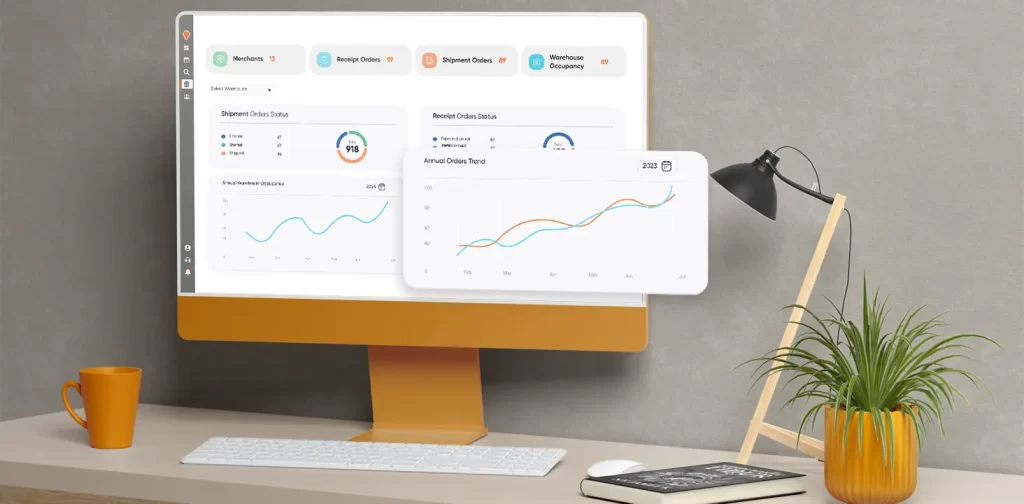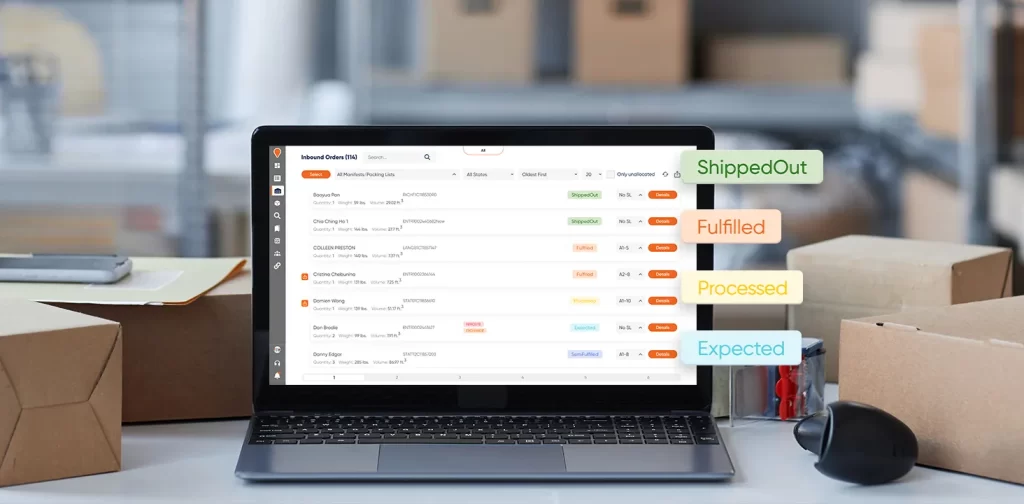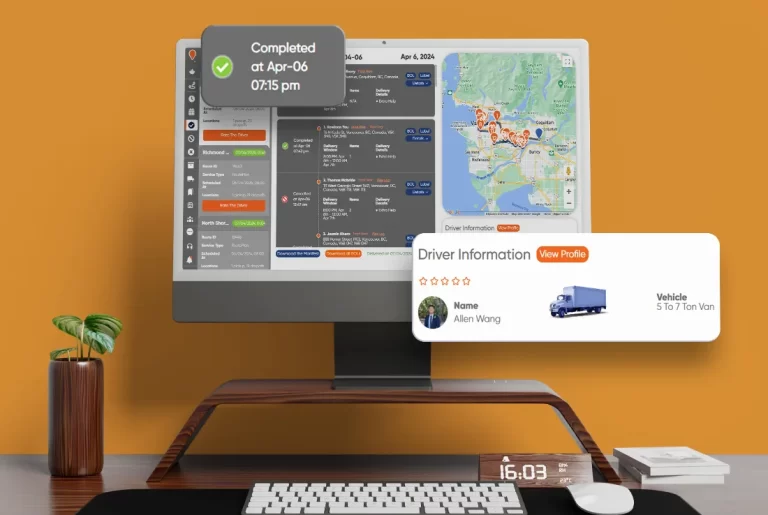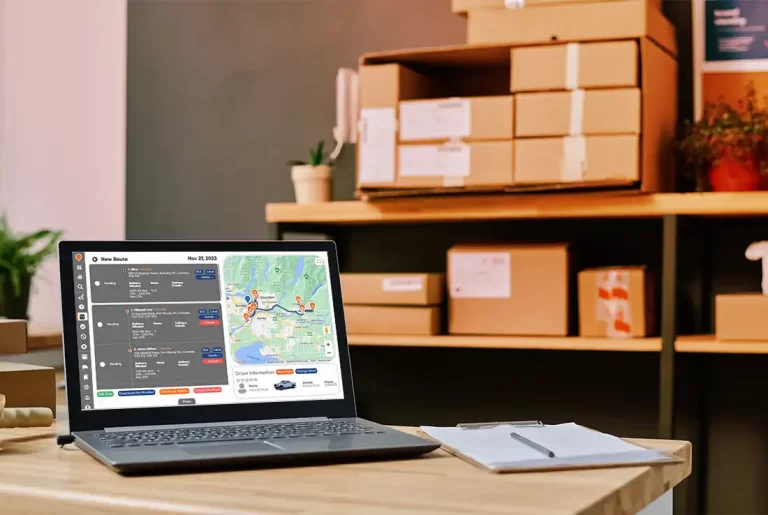In the bustling world of e-commerce, businesses constantly seek ways to streamline their operations, cut costs, and keep their customers happy. The benefits of Delivery Management Software (DMS) are crucial in achieving these goals.
DMS simplifies operations by optimizing route planning, providing real-time shipment tracking, and offering valuable insights into the delivery process. This software helps businesses achieve significant improvements in their delivery management, ensuring timely and accurate deliveries, which in turn boosts customer loyalty and reduces operational expenses.
By implementing DMS, e-commerce companies can effectively manage their deliveries, leading to a more efficient and cost-effective operation. In this blog, we will explore the top 10 benefits of DMS in detail.
What is Delivery Management Software (DMS)?
It is an innovative solution designed to improve various aspects of logistics and supply chain operations within the delivery process. It is commonly used by e-commerce, retail, delivery services, transportation, and third-party logistics companies and the benefits of delivery management software are wide-ranging.
Specialized logistics software plays a major role in augmenting efficiency, precision, and customer satisfaction in delivery operations. By automating and optimizing the entire delivery process, DMS equips businesses to meet the rapidly evolving demands of contemporary e-commerce and logistics networks.
Whether coordinating complex consignments or single parcel shipments, DMS attempts to streamline each step and transaction throughout the entire delivery lifecycle. From initial dispatch through customer receipt, all interim stages such as transportation, handling, and tracking benefit from its integrative capabilities.
Deploying such a centralized and comprehensively empowering software resource is promising for sustaining competitive advantage among industry leaders striving to meet modern fulfillment and client care requirements.
Benefits of Delivery Management Software For E-Commerce Businesses

1. Improved Efficiency
It is generally believed that efficiency is the lifeblood of flourishing in the competitive e-commerce world. Comparable to a precisely coordinated machine, delivery management software assumes responsibility for the full sequence of order delivery, from dispatch and transportation visibility to verification of fulfillment.
Beyond merely streamlining the delivery workflow, such solutions minimize the potential for deficient fulfillment by eliminating repetitive manual processes and automating transactions susceptible to human error. This reduces the risk of mistakes while achieving expedited order finalization through optimized coordination of intermediary waystations.
By providing real-time insights into delivery status updates and exceptions, such software enables timely identification and resolution of issues. The benefits of delivery management software include overall operational streamlining, risk mitigation, and assurance of punctual order completion, which collectively enhance e-commerce efficacy.
2. Cost Savings
Cost savings are highly important for sustainability in the competitive e-commerce world. Best delivery management software can create an environment that promotes cost efficiency through diverse mechanisms.
Route optimization and scheduled logistics coordination reduce fuel expenses by shortening travel distances and improving efficiency. Meanwhile, digital record-keeping replaces manual paperwork, cutting down on associated labor expenses.
The benefits of delivery management software include gradual accrual of savings through reduced fuel usage originating from systematic routing intelligence. Expense reductions also stem from relying on integrated software rather than physical documentation processing.
In the long run, consistent utilization of unified delivery management software can generate notable cumulative cost savings that bolster operating margins. Prudent allocation of capital resources through technology reinvestment preserves competitiveness and supports longevity in the industry.
3. Enhanced Customer Satisfaction

Satisfied customers form the cornerstone of a sustainable enterprise. Delivery management software, partnered with a capable mobile application, provides adaptability for consignment tracing and real-time status updates.
By providing insight into expected delivery times, consumers gain reassurance that procurements are progressing as planned. Transparency in the delivery lifecycle cultivates trust as clients witness the journey firsthand.
One of the outstanding benefits of delivery management software is its ability to enhance visibility, thereby strengthening the client experience. Reputational benefits emerge from satisfied customers who are empowered by the technology’s adaptability to increase transparency.
Confidence and loyalty result from such a solution’s provision of consistent, predictable service within today’s heightened requirements. Overall fulfillment is efficiently achieved, fostering elevated satisfaction through systematic shipment management and communication tools.
4. Faster Delivery Times
Speed holds tremendous significance in the contemporary fast-paced business world. Therefore, pragmatic considerations like dispatch optimization prove invaluable.
Delivery management platforms systematically coordinate vehicle routes and dispatching to facilitate timely deliveries. Whether fulfilling demands for same-day or next-day arrival, clients will appreciate the promptness enabled by cutting-edge logistical coordination.
Some of the benefits of delivery management software are optimized route plotting and transport scheduling that result in accelerated fulfillment times. Particularly within e-commerce, where high-speed delivery alternatives are often expected, each saved moment gains significance.
Proactively utilizing technological resources to enhance operational efficiency represents a key competitive differentiator. Strategic alliances with specialists furnishing sophisticated logistical management position merchants to meet modern consumer expectations effectively. Swift order fulfillment fosters sustained loyalty in dynamic industry conditions.
5. Inventory Management

Inventory management is the cornerstone of a successful e-commerce enterprise. Delivery management software enables efficient integration with stock administration systems to maintain vigilant control.
By maintaining up-to-date visibility into inventory, such solutions prevent stockouts or warehouse congestion that can hinder operational success. Real-time synchronization ensures that available commodities align with predicted demand profiles.
Interfacing delivery coordination directly with inventory levels circumvents inefficiencies caused by improper resource allocation. Strategic replenishment is implemented to meet projected fulfillment needs.
Easy integration provided by these technological solutions enables merchants to optimize stock positioning, which enhances customer satisfaction. The benefits of delivery management software include dynamic interoperability between logistical coordination and inventory management, mitigating vulnerabilities that can undermine service standards.
6. Data Analytics
It is believed that an informed perspective cultivates influence. Comprehensive delivery management software, with insightful analytics and dashboard capabilities, empowers stakeholders to scrutinize fulfillment efficacy.
By analyzing performance statistics, customer preferences, and potential improvements, e-merchants gain a thorough understanding of operational dynamics. Data-driven visibility facilitates informed decision-making and continuous refinement based on identified trends.
A methodical evaluation of metrics sheds light on delivery performance, popular products and locations, and return tendencies. Armed with objective intelligence, management can continually strategize to better align with evolving marketplace demands.
Among the benefits of delivery management software is its intuitive control panel, which enables management to track progress, identify variances, and implement corrective measures precisely as warranted. Evidence-based reform cultivates competitive superiority through continuous progress, driven by in-depth business understanding.
7. Flexibility
As e-commerce business evolves, functionality must correspondingly increase to maintain efficiency. The benefits of delivery management software include durable scalability to accommodate market growth.
Appropriate delivery infrastructure expands competently to meet the growing demands originating from broader assortments, new target locations, or increased transaction volumes that naturally accompany progression. Systematic flexibility ensures continued efficiency through dynamic industry transformations.
Whether broadening inventory scope, expanding geographic reach, or adjusting to increased order levels, these unified systems adapt naturally while maintaining optimized coordination. Effortless reconfiguration spares managers from operational disruption as the company grows.
Future-proofed technological investments shield organizations from excessive reengineering costs that can accumulate as the company expands. Continual optimization ensures maximum throughput, supporting sustained growth momentum.
8. Route Optimization

Route optimization reduces both financial outlay and environmental impact by optimizing vehicle deployment routes and compressing vehicle deployment durations through advanced algorithmic planning.
Minimizing fuel usage through shorter transport distances inherently decreases operating expenses over the long term. Simultaneously, reducing carbon emissions through consolidated vehicle dispatch benefits the broader community.
Thoughtful logistical coordination to reduce travel redundancy achieves the proverbial two birds-with-one-stone scenario. Merchants secure both economic and eco-conscious advantages by using advanced routing intelligence to strategize delivery itineraries.
As sustainability initiatives grow in priority, platforms that help organizations shrink their carbon footprints gain esteem. Reducing supply chain costs while also creating pro-environmental efficiencies makes a delivery management system a wise long-term investment. Continuous progress nurtures a favourable reputation and goodwill.
9. Driver Management
Strategic driver management plays a major role in fulfillment dependability. Optimizing task assignments, conducting performance monitoring, and ensuring efficient fleet operations are among the benefits of delivery management software.
With automated routing functionality and real-time workflow oversight, dispatchers can systematically assign delivery runs optimized for maximum throughput. Dynamic task allocation maintains operational pace and service standards.
Concurrently, integrated performance analytics provide visibility into each driver’s adherence. Tracking metrics like estimated arrival variances, route deviations, or customer feedback helps ensure exemplary conduct. Remediation occurs where deviations arise.
Unified workflow guidance and real-time fleet transparency underpin a cohesive transport team. This coordinated system helps ensure predictable, consistent client experiences, thereby enhancing reputation by reliably meeting demand promptly.
10. Competitive Advantage

Within the competitive e-commerce world, a well-executed delivery management system acts as a key differentiator. Among the top features of delivery management software are its foresight and dedication to streamlined operations and exceptional client care, which can attract and retain customers.
By demonstrating adaptability through sophisticated logistical coordination optimized for accuracy, speed, and transparency, merchants emphasize logistical excellence. Commitment to precision in logistics, aimed at meeting even the most demanding fulfillment expectations, builds a strong reputation.
Loyalty accrues from fulfillment managed with intent, diligence, and expertise, supported by cutting-edge routing technology. Customers tend to favor established retailers who demonstrate mastery over intricate supply chains with long-term optimization in mind.
Strategic leveraging of integrated technology translates to a sustainable advantage over competitors with less vision. While some view logistics narrowly, forward-thinking firms recognize its importance in the buying process and devote resources to strengthening it over time.
Final Thoughts
Implementing a delivery management software platform integrated with a complementary mobile interface offers numerous advantages for e-commerce ventures, encapsulating the core benefits of such solutions. From increased efficiency and cost containment to increased customer satisfaction and a differentiated market position, the benefits of delivery management software are pervasive and impactful.
By streamlining operations, optimizing performance, providing analytic perspective, and fostering satisfaction through real-time visibility, a scalable DMS distinguishes progressive organizations as leaders in fulfillment excellence. Cost savings, heightened service standards and sustainable competitive advantage emerge from this technological alliance.
To thrive in the rapidly evolving e-commerce business and be perceived as a model of reliability through optimized logistic synchronization, implementing a robust delivery oversight solution customized to operational nuances is a prudent step. Strategic adoption of such specialized support nurtures continuous improvement and fortifies long-term viability among discerning clients.
FAQs
Here are some of the Frequently Asked Questions about the benefits of delivery management software:
1. Is Delivery management software useful for handling returns and exchanges in e-commerce?
Yes, it simplifies the returns process by managing pickup schedules and tracking returned items, making the process more efficient for both the business and the customer.
2. Can delivery management software help in reducing delivery costs?
Optimizing routes and improving delivery efficiency reduces the costs associated with logistics and delivery, which is another key benefit of delivery management software.
3. How does delivery management software enhance customer satisfaction?
Delivery management software enhances customer satisfaction by providing real-time tracking, accurate delivery windows, and timely updates, ensuring a transparent and reliable delivery experience.
4. Can delivery management software integrate with existing e-commerce platforms?
Yes, most delivery management software solutions are designed to seamlessly integrate with existing e-commerce platforms, allowing for smooth data flow and cohesive operations without the need for extensive system overhauls.
5. Does delivery management software offer insights and analytics for performance improvement?
Yes, it provides detailed analytics and reporting on delivery performance, customer feedback, and operational metrics, enabling businesses to identify areas for improvement and make data-driven decisions to enhance overall efficiency.





